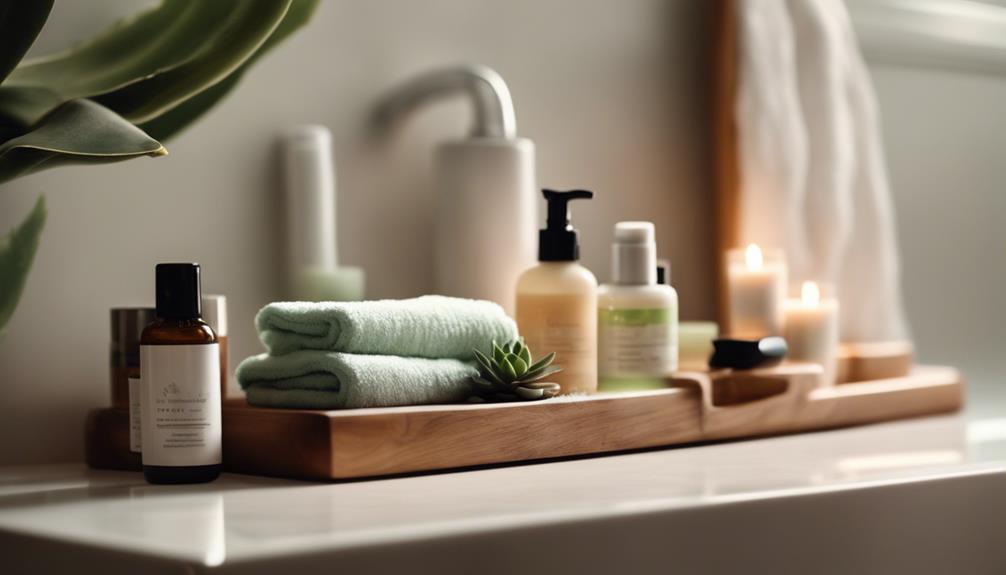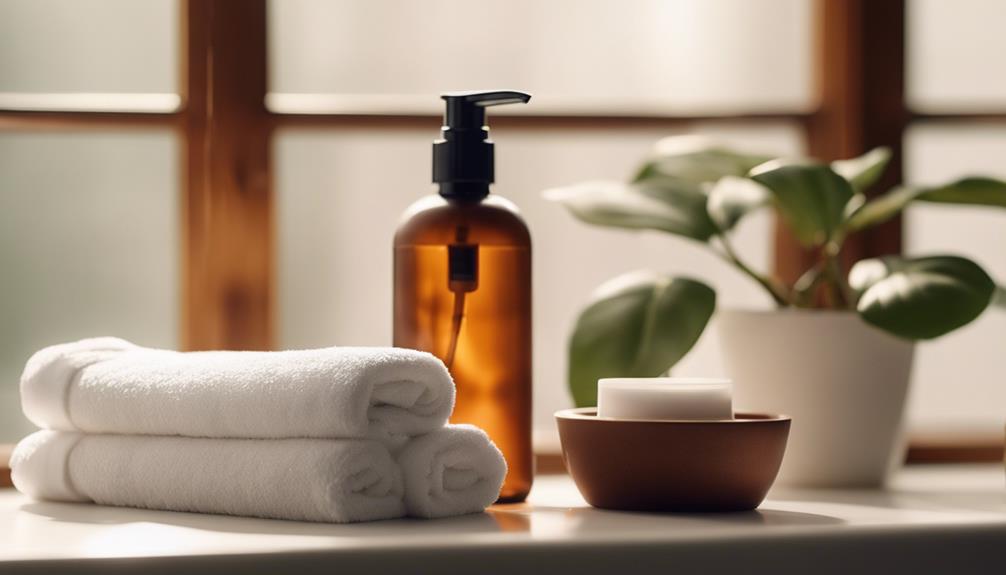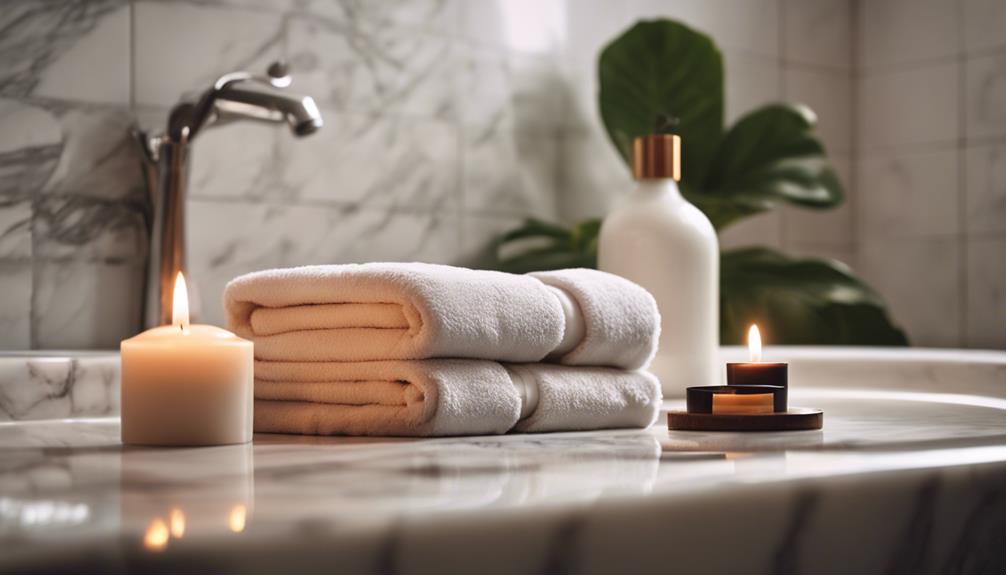To address dry skin, begin by using a gentle hydrating cleanser that contains glycerin. Then, incorporate an alcohol-free toner with vitamin E to prime your skin. Boost moisture levels by applying a serum that is rich in humectants like hyaluronic acid. Finish off with a luxurious moisturizer that contains ceramides to lock in hydration. For the nighttime routine, repeat the cleansing process and apply a hydrating toner. Utilize a nourishing night cream to promote overnight recovery. Remember to apply sunscreen daily to prevent moisture loss. For more effective tips and product recommendations to enhance your skincare routine, check out the link provided.
Key Takeaways
- Use a gentle, moisturizing cleanser with glycerin and hyaluronic acid to prevent moisture loss during cleansing.
- Apply a hydrating serum with humectants like niacinamide immediately after cleansing to enhance moisture absorption.
- Choose a rich moisturizer containing ceramides to lock in hydration and restore the skin barrier.
- Incorporate an overnight moisturizer rich in hyaluronic acid and ceramides for intensive hydration while you sleep.
Understanding Dry Skin
Dry skin, or xerosis, happens when your skin barrier breaks down, leading to moisture loss and uncomfortable symptoms like flakiness and tightness. Your skin barrier is vital for maintaining hydration, as it protects against environmental stressors and helps retain moisture. When this barrier is compromised, you might notice increased dryness, itching, and irritation.
Several factors contribute to dry skin. Environmental elements like low humidity, cold weather, and indoor heating can greatly exacerbate the condition. These factors can strip your skin of its natural oils, making it vital to adjust your skincare routine seasonally. Additionally, as you age, your skin's oil production decreases, especially after the age of 40, which can worsen dryness and sensitivity.
Certain skin conditions, such as eczema and psoriasis, are also linked to dry skin. If you're experiencing persistent dryness, it's important to seek targeted treatment to restore your skin's moisture balance. Understanding these factors can help you take proactive steps towards healthier skin, ultimately preventing discomfort and enhancing your overall well-being.
Key Ingredients for Hydration
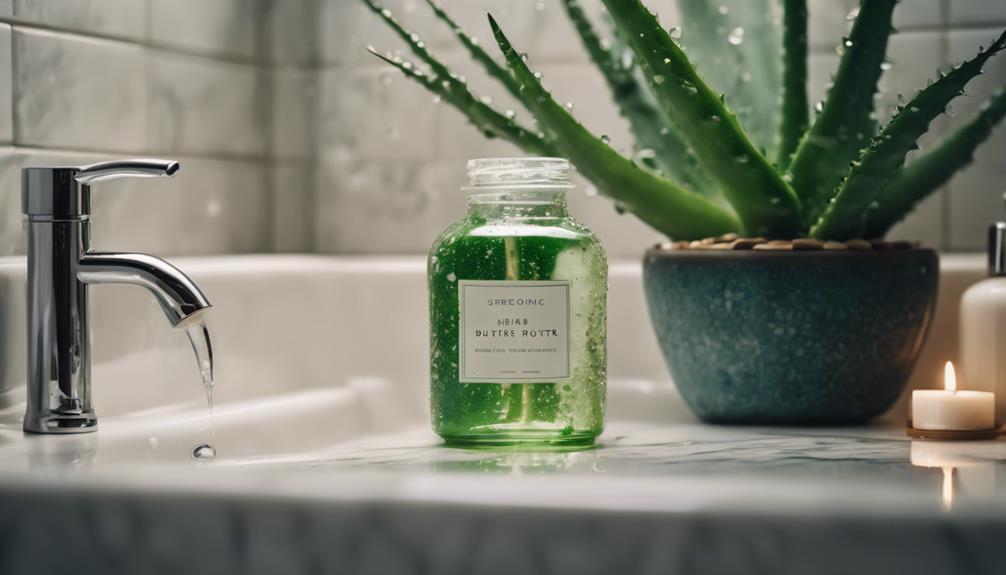
When it comes to hydrating dry skin, knowing the right ingredients can make all the difference.
You'll want to look for powerful humectants and nourishing oils that trap moisture and strengthen your skin barrier.
Let's explore some essential hydrating ingredients and product recommendations to help you achieve that dewy glow.
Essential Hydrating Ingredients
Essential hydrating ingredients like hyaluronic acid and ceramides play a crucial role in keeping your skin moisturized and healthy. Hyaluronic acid is a powerhouse humectant that can hold up to 1,000 times its weight in water. This means it effectively attracts and retains moisture in your skin for up to 24 hours, making it a must-have in your routine.
Ceramides, on the other hand, are lipid molecules that work to restore and maintain your skin's natural barrier. They lock in moisture and prevent water loss, ensuring your skin stays hydrated throughout the day.
Another fantastic ingredient to look for is glycerin. This widely used humectant draws moisture from the environment to improve your skin's hydration and texture, making it feel softer and smoother.
Incorporating these essential hydrating ingredients into your skincare routine can greatly enhance your skin's moisture levels. When combined, they create a powerful synergy that not only hydrates but also protects your skin from dryness and irritation.
Moisturizing Product Recommendations
Choosing the right moisturizing products can make all the difference in keeping your skin beautifully hydrated and healthy.
When selecting a moisturizer, look for key moisturizing ingredients that cater to dry skin. Start with humectants like hyaluronic acid and glycerin, which draw moisture into your skin. Pair these with occlusives such as shea butter or petrolatum to seal in that hydration effectively.
Ceramides are essential in your quest for hydration, as they help restore your skin's barrier and retain moisture. Including a hydrating serum in your routine can further boost your hydration levels. A serum with hyaluronic acid can provide an extra layer of moisture, and studies show that 90% of users notice improved hydration with regular use.
Don't overlook night creams containing niacinamide and peptides—these ingredients not only hydrate but also support skin barrier repair and enhance texture.
Morning Skincare Routine
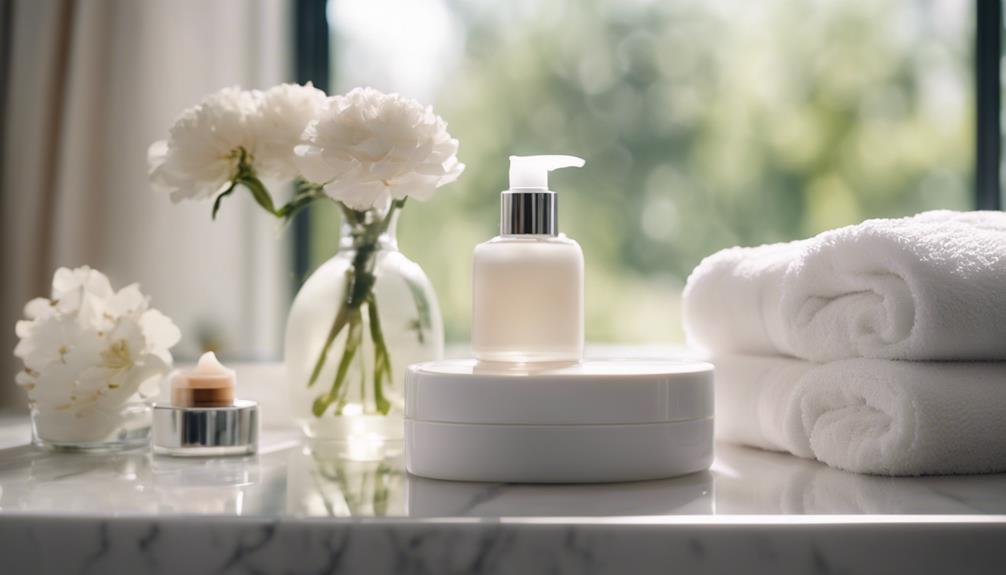
Start your day with a gentle, moisturizing cleanser that hydrates your skin without stripping its natural oils. Look for one packed with hydrating ingredients like glycerin and hyaluronic acid. This sets a solid foundation for your morning skincare routine.
Follow this with an alcohol-free toner that contains vitamin E and aloe to prep your skin for the next steps.
Here's a quick morning skincare routine you can follow:
- Cleanser: Use a moisturizing cleanser to cleanse while hydrating your skin.
- Toner: Apply an alcohol-free toner with hydrating properties to soothe and refresh.
- Serum: Choose a serum enriched with humectants like niacinamide to draw moisture into your skin and even out your complexion.
- Moisturizer: Finish with a rich moisturizer containing ceramides to lock in hydration and create a protective barrier.
Don't forget to apply a broad-spectrum sunscreen with SPF 30 or higher to shield your skin from UV damage.
For an extra hydration boost, consider adding a weekly sheet mask designed for dry skin. This will help enhance moisture levels throughout the day!
Nighttime Skincare Routine
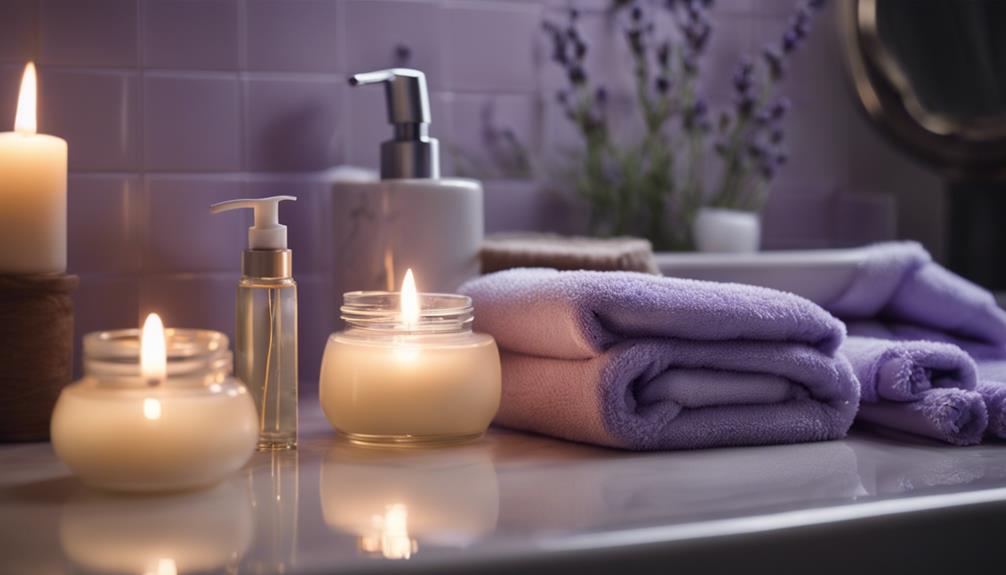
When it comes to your nighttime skincare routine, gentle cleansing is key to removing impurities without drying out your skin.
After cleansing, applying a hydrating serum can boost moisture levels and target dryness effectively.
Gentle Cleansing Techniques
A gentle oil or gel cleanser effectively removes makeup and impurities without stripping your skin's natural oils. Using the right cleansing techniques sets the foundation for your nighttime skincare routine. Here are some tips to help you achieve a thorough yet gentle cleanse:
- Choose Fragrance-Free: Opt for products with hydrating ingredients like glycerin and hyaluronic acid. This minimizes irritation and adds moisture during cleansing.
- Use Lukewarm Water: Rinse your face with lukewarm water. Hot water can worsen dryness and irritate sensitive skin, so keep it comfortable.
- Gentle Application: Massage the cleanser onto your face in circular motions. This helps lift away dirt and makeup without harsh scrubbing, maintaining your skin's integrity.
- Follow Up with a Toner: After cleansing, use a hydrating toner to replenish moisture. This step prepares your skin for the next treatments.
Hydrating Serums Application
Applying hydrating serums on damp skin right after cleansing boosts absorption and locks in essential moisture. This step is vital for achieving peak hydration, especially if you're dealing with dry skin.
Look for hydrating serums that feature hyaluronic acid, as it can attract and hold up to 1,000 times its weight in water. This powerful ingredient guarantees intense hydration, making it a must-have in your nighttime routine.
After applying the serum, give it a few minutes to absorb fully into your skin. This wait guarantees that you get the full benefits of the serum without interference from other products.
If you want to enhance moisture retention even further, consider layering a few drops of facial oil over the serum. This additional step seals in hydration, providing your skin with the nourishment it craves overnight.
Don't forget about incorporating niacinamide into your regimen as well. It helps improve your skin barrier function and soothes dryness while promoting an even skin tone.
Overnight Moisturizer Benefits
Overnight moisturizers deliver intensive hydration while your skin repairs itself, guaranteeing you wake up with a refreshed and nourished complexion. These products are essential for maintaining ideal skin health, especially if you have dry or sensitive skin.
Here are four key benefits of using an overnight moisturizer:
- Enhanced Hydration: Rich in ingredients like hyaluronic acid and ceramides, these moisturizers help restore moisture levels, keeping your skin plump and hydrated.
- Improved Skin Barrier Function: Regular use strengthens your skin's barrier, preventing moisture loss and making your skin more resilient over time.
- Smoother Texture: Night creams enable deeper penetration of active ingredients, improving skin texture and reducing the appearance of fine lines and wrinkles.
- Protection from Stressors: Applying an overnight moisturizer minimizes exposure to environmental aggressors, allowing your skin to recover and rejuvenate while you sleep.
To maximize hydration, apply your overnight moisturizer within five minutes of washing your face. This guarantees your skin absorbs all the moisture it needs, setting the stage for a radiant morning glow.
Step-by-Step Hydrating Routine

Begin your hydrating routine with a gentle, non-foaming cleanser to effectively remove impurities while preserving your skin's natural oils. Look for a cleanser containing glycerin or hyaluronic acid for ideal results. After cleansing, apply a hydrating toner enriched with vitamin E and aloe. This step enhances moisture levels and prepares your skin for the next products.
Next, reach for a hydrating serum formulated with hyaluronic acid. This key ingredient attracts and retains moisture, ensuring your skin remains plump and hydrated throughout the day. Once the serum is absorbed, seal in that hydration with a rich moisturizer that includes ceramides. Apply this within five minutes of cleansing to lock in moisture effectively.
Finally, don't forget to protect your skin with a broad-spectrum sunscreen of SPF 30 or higher to shield it from UV damage. This is essential, especially if you have dry skin, as UV rays can worsen dryness and irritation.
| Step | Product Type | Key Ingredient |
|---|---|---|
| Step 1 | Cleanser | Glycerin |
| Step 2 | Toner | Vitamin E |
| Step 3 | Hydrating Serum | Hyaluronic Acid |
| Step 4 | Moisturizer | Ceramides |
| Step 5 | Sunscreen | SPF 30+ |
Recommended Products for Dry Skin
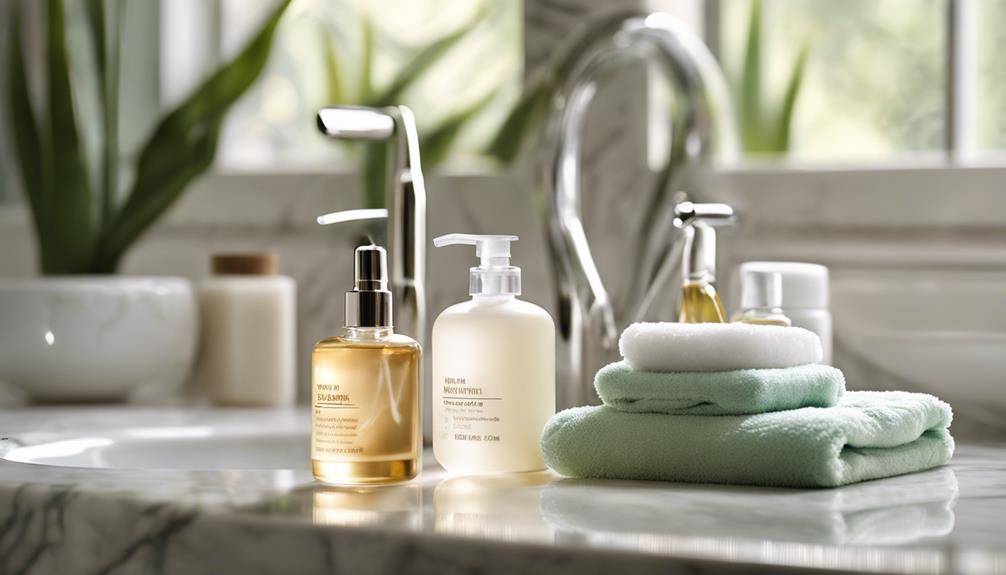
Finding the right products for dry skin can make all the difference in achieving a hydrated and healthy complexion. To help you enhance your skincare routine, here are some recommended products for dry skin that incorporate effective hydrating tips:
- AM Facial Moisturizing Lotion SPF 30: This lotion is packed with ceramides, hyaluronic acid, and niacinamide, making it perfect for normal to dry skin while protecting you from the sun.
- Hydrating Foaming Oil Cleanser: Transforming from oil to foam, this cleanser removes impurities without stripping moisture, thanks to glycerin and ceramides that boost hydration.
- Hydrating Hyaluronic Acid Serum: A must-have for dry skin, this serum delivers intense hydration, with 90% of users experiencing noticeable moisture improvements.
- PM Facial Lotion: Designed for overnight hydration, this lotion locks in moisture and supports skin recovery with niacinamide and ceramides while you sleep.
Additional Care Tips
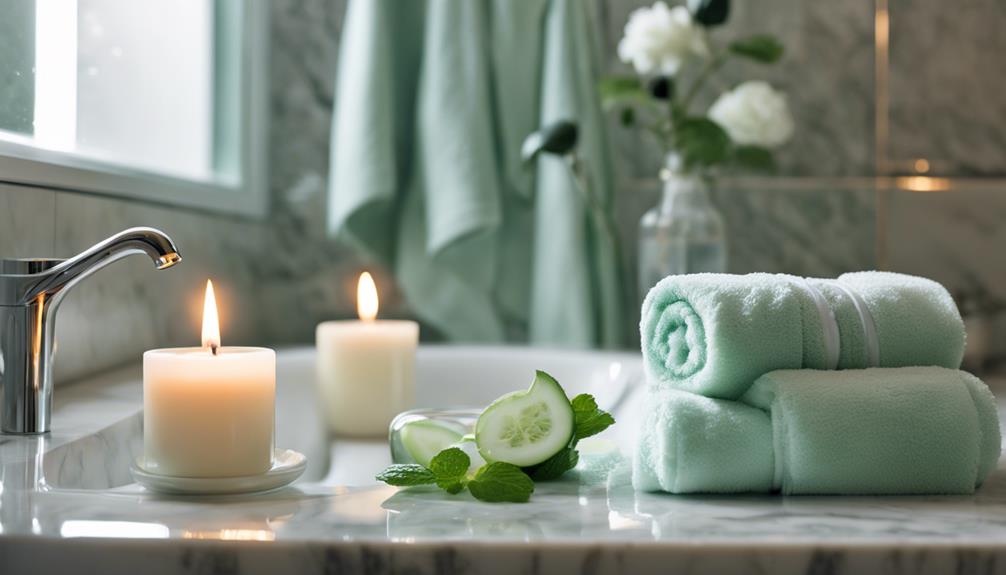
To keep your dry skin feeling its best, follow these additional care tips that can help lock in moisture and protect your skin barrier.
First, limit your baths and showers to 5-10 minutes, using warm water instead of hot. This helps prevent moisture loss and reduces skin irritation. Right after drying off, apply your moisturizer within three minutes to effectively trap that hydration.
Consider adding a humidifier to your living space, especially during dry winter months or in low-humidity environments, to maintain indoor moisture levels. This extra humidity can greatly hydrate your skin.
After washing your hands, use a non-greasy hand cream to combat dryness and protect your skin barrier, particularly if you frequently wash your hands.
When heading outdoors in cold weather or when handling irritating substances, don't forget to wear protective gloves. This simple step shields your skin from moisture loss and damage, keeping it healthy.
Importance of Sun Protection
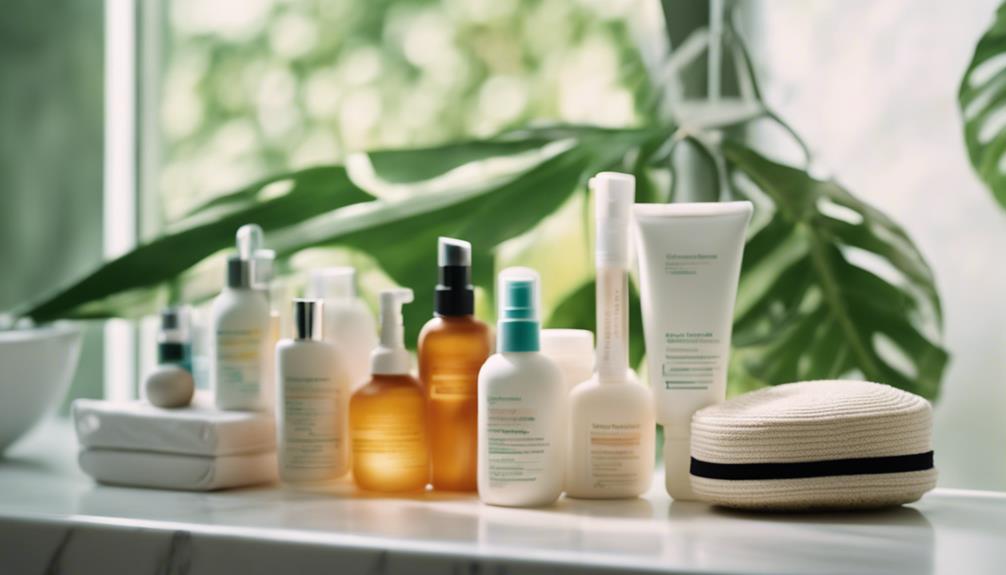
Protecting your skin from the sun is just as important as keeping it moisturized, especially since UV rays can worsen dryness and lead to further damage. Without proper sun protection, you may experience increased moisture loss, making your dry skin even more vulnerable.
Here are four essential tips to guarantee you're safeguarding your skin:
- Choose the Right SPF: Always opt for a broad-spectrum sunscreen with an SPF of 30 or higher. This shields you from both UVA and UVB rays, reducing the risk of sun damage.
- Apply Regularly: Don't forget to reapply your sunscreen every two hours, particularly after sweating or swimming. Consistent application is key to maintaining effective sun protection.
- Consider Mineral Sunscreens: If you have sensitive or dry skin, mineral sunscreens with zinc oxide or titanium dioxide are often better tolerated, minimizing irritation.
- Make It a Daily Habit: Incorporate sunscreen into your daily skincare routine to prevent premature aging, fine lines, and wrinkles, which can be more pronounced with dry skin.
Professional Guidance for Dry Skin

Seeking professional guidance can greatly enhance your approach to managing dry skin and guarantee you're using the most effective treatments for your unique needs. If your dry skin persists despite your home care efforts, it's time to consult a dermatologist. They can identify any underlying conditions that may be contributing to your skin issues and prescribe stronger treatments as needed.
During your visit, dermatologists often recommend moisturizers that contain ceramides and hyaluronic acid. These ingredients are essential for restoring and maintaining your skin barrier, ensuring ideal hydration. With tailored skincare routines, dermatologists can address your specific concerns, helping you select suitable products for maximum hydration and protection.
Regular skin examinations with a board-certified dermatologist can also help you catch potential skin issues early, allowing for timely intervention. Additionally, dermatologists emphasize the importance of sun protection in combating skin damage and dehydration. They typically advise using a broad-spectrum SPF of 30 or higher daily to safeguard your skin.
Incorporating professional guidance into your skincare routine not only enhances your hydration efforts but also promotes healthier, more resilient skin in the long run.
Common Misconceptions About Dry Skin
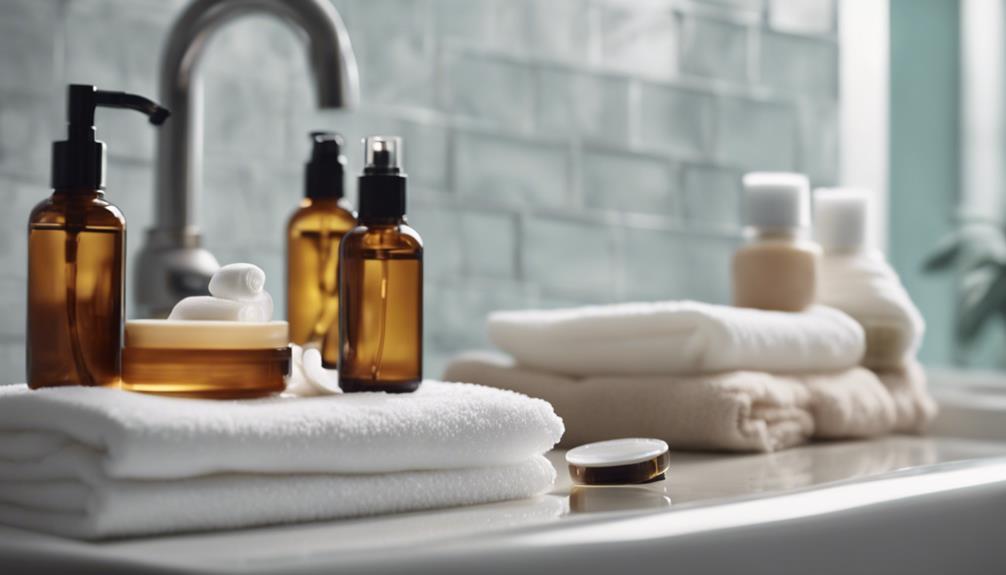
Understanding your skin's needs is essential, especially when it comes to debunking common misconceptions about dry skin that can hinder effective treatment. Here are four myths you should know about:
- Drinking water is enough: While hydration is important, topical moisturizers containing humectants, emollients, and occlusives are critical for maintaining moisture levels in your skin.
- Oily skin can't be dry: Oily skin types can absolutely experience dryness. This dehydration can lead to an imbalance that causes breakouts or irritation.
- Harsh scrubs help: Many believe that scrubbing away dryness improves the skin, but over-exfoliating damages your skin barrier, worsening dryness and sensitivity.
- All moisturizers are the same: Not all products are created equal. Look for moisturizers with ingredients like ceramides, hyaluronic acid, and glycerin that specifically target dryness and effectively retain moisture.
Additionally, never skip sunscreen, as it's essential for preventing moisture loss and protecting against UV damage.
What Are Some Hydrating Tips for a Dry Skin Skincare Routine?
Looking for the best hydrating skincare routine for dry skin? Start by using a gentle cleanser, followed by a hydrating serum with ingredients like hyaluronic acid. Incorporate a rich moisturizer and don’t forget to drink plenty of water. Exfoliate regularly to remove dry, flaky skin and enhance product absorption.
Conclusion
So, you thought slathering on any moisturizer would solve your dry skin woes?
Ironically, it's all about choosing the right products and creating a consistent routine.
By understanding your skin's needs and incorporating key hydrating ingredients, you can transform your complexion.
Don't forget about sun protection and seeking professional advice if needed.
With a little effort and the right approach, you'll soon discover that your skin can be as smooth as silk, rather than a desert wasteland.
